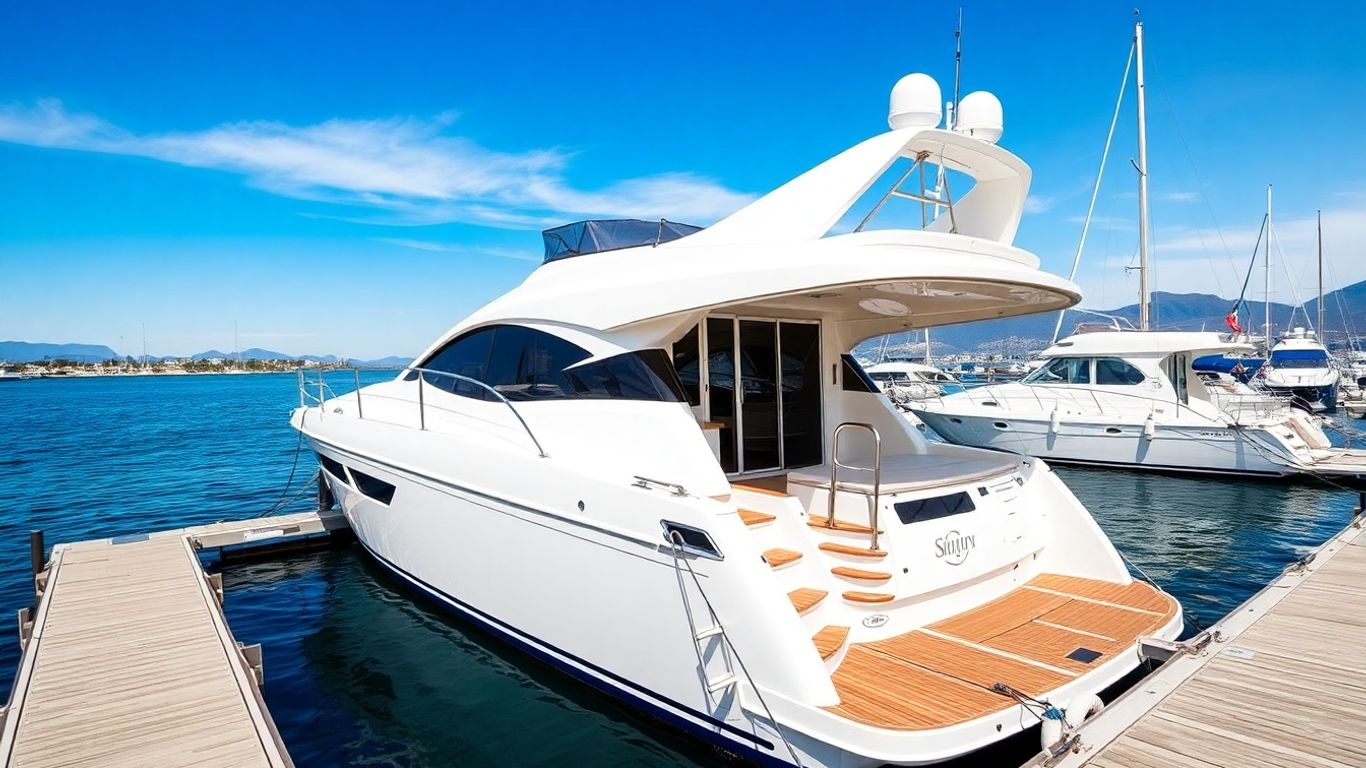Thinking about buying a used small yacht for sale in 2025? It might seem like a big leap, but it can be a great way to get out on the water without breaking the bank. Whether you want a boat for weekend adventures, fishing trips, or just relaxing with friends, there’s a lot to consider before you sign on the dotted line. This guide breaks down what you need to know—from figuring out your real budget to finding the right yacht and making sure you don’t miss any important steps along the way. Let’s get started and make your boat-buying journey as smooth as possible.
Key Takeaways
- Set a realistic budget that includes more than just the purchase price—think about repairs, storage, and ongoing costs.
- Decide what kind of yacht fits your lifestyle and needs, whether it’s for cruising, fishing, or family outings.
- Look for used small yachts for sale on trusted online sites, at local dealerships, and at boat shows to compare your options.
- Always do a detailed inspection and get a marine survey before you buy, so there are no expensive surprises.
- Work with a reputable broker or dealer who can help with paperwork, negotiations, and making sure everything is legal.
Assessing Your Budget and Understanding All Costs

There’s a lot of excitement around buying a used small yacht, but let’s be real—the numbers can be a real eye-opener. Before you even start browsing listings, you have to know what your wallet can handle, not just upfront, but long after the sale.
Calculating the True Cost of Yacht Ownership
The purchase price is only part of your yacht’s overall cost. You’ll need to plan for annual expenses and unexpected fees, or the boat might end up costing more than you bargained for. Here’s what most buyers overlook:
| Annual Expense Category | Typical Range (USD) |
|---|---|
| Maintenance & Repairs | $2,000 – $10,000+ |
| Insurance | $800 – $4,000 |
| Dockage/Storage | $1,500 – $8,000+ |
| Fuel | $500 – $3,000+ |
| Registration/Taxes | $500 – $4,000 |
- Plan for surprise repairs, especially with older models.
- Winter storage and hauling fees in colder climates can add up fast.
- Don’t forget mandatory safety gear and licensing costs.
Tucking away at least 10-20% of your boat’s value each year for upkeep is the difference between yacht ownership feeling fun or like a money pit.
Financing Options and Loan Preparation
You don’t always need a suitcase of cash to buy a yacht. If you’re considering financing, here’s what to keep in mind:
- Check your credit score before applying—rates and approval odds can vary a lot.
- Shop both banks and marine lenders for rates and loan length options.
- Prepare documentation: income proof, tax returns, and info on the yacht you want.
- Expect a down payment of 10-20% of the yacht’s value.
Some lenders require surveys or insurance before funding, so ask about requirements up front. If your yacht is over a certain age or price, expect more scrutiny—sometimes insurers or lenders want extra inspections.
Accounting for Taxes, Registration, and Storage
It’s not just about what you pay the seller. Government fees and logistics can make a big difference:
- State/local sales tax can range from 0% to over 7% depending on where you buy and where you plan to keep your yacht.
- Registration costs vary by vessel size and location—set aside at least a few hundred dollars.
- Long-term storage: Will you need a marina slip or a trailer? Year-round dockage in popular harbors can cost as much or more than your car payment.
Even after the sale is done, you’ll keep writing checks. The best bet? Talk to local marina staff or yacht owners to get the real scoop on long-term costs in your area.
Choosing the Ideal Used Small Yacht for Sale to Suit Your Lifestyle
Getting the right used small yacht takes more than scrolling through listings and jumping at the first deal. You want something that fits your plans, your comfort level on the water, and how much time you’ll spend onboard each year. Here’s how to figure out what matters most for your boating life.
Defining Your Intended Use for the Yacht
- Write down why you’re buying a yacht. Are you hoping for relaxing weekend trips, short family cruises, fishing with friends, or maybe longer coastal adventures?
- Count how many people will be joining you most of the time. Small yachts range from cozy cabins for two to surprisingly spacious spaces for six or more.
- Be honest about your boating style—do you want something easy to handle solo, or are you a fan of group outings and need extra amenities?
The best yacht isn’t always the fanciest one; often, it’s the boat that makes your favorite activities feel effortless and fun.
Comparing Types: Motor vs. Sailing Yachts
Let’s do a quick side-by-side of the most common choices:
| Feature | Motor Yacht | Sailing Yacht |
|---|---|---|
| Speed | High (20-40 knots) | Moderate (5-10 knots) |
| Fuel/Operating Costs | Higher | Lower |
| Maintenance | Engine-heavy, more systems | Rigging, sails, less engine |
| Handling | Easier for beginners | More skill/learning required |
| Experience | Power cruising | Quiet, hands-on, traditional |
- Motor yachts are great for folks who want speed and convenience—think last-minute adventures and less time worrying about the wind.
- Sailing yachts give you more connection to the water (and save on gas), but there’s a learning curve and more active work at sea.
Evaluating Features and Amenities
Every small yacht comes with its own set of features. Decide which ones matter most based on your regular plans:
- Sleeping arrangements: Are you camping out overnight, or just taking day trips?
- Galley (kitchen): Need a full cooking space or just a mini-fridge and grill?
- Shower/Bathroom: Will you want a proper head and shower or is marina access enough?
- Entertainment: Is a sound system or TV necessary, or do you prefer a more off-the-grid atmosphere?
- Outdoor spaces: Consider sundecks, flybridges, and cockpit seating for socializing or relaxing.
Make sure to check the boat’s age, layout, and condition—sometimes a yacht that’s a bit older but well-kept is a better deal than a flashier, newer one that’s been neglected.
- Look for features that will save money later, like fuel-efficient engines or a reliable navigation system.
- If you plan to go further from shore, see if the yacht is equipped for longer trips and has space for safety gear.
- Think about how much regular maintenance you’re willing (or able) to do. Some systems are DIY-friendly, while others require professional help.
In the end, picking a used yacht is a mix of practical choices and a little gut feeling. You’ll know it’s right when you picture yourself out there, really enjoying every moment—even if you’re just anchored and sipping coffee on a Sunday morning.
Where to Find the Best Used Small Yacht for Sale
Finding the right used small yacht isn’t always simple, but if you know where to look, you can spot some great deals and hidden gems. Knowing your options makes the search less overwhelming and a lot more productive.
Browsing Online Platforms and Classifieds
Online platforms have changed the way people search for used yachts. Boat listing sites offer huge selections, with filtering options for length, price, age, and brand. Take advantage of these features to narrow your hunt. Here’s a handy table comparing popular options:
| Platform Name | Typical Listings | Key Features |
|---|---|---|
| YachtWorld | 40,000+ | Global reach, detailed specs |
| Boat Trader | 15,000+ | Search filters, price tracking |
| Dealer Websites | Varies | Direct deals, certified pre-owned |
- Read full ad descriptions and inspect photo galleries closely.
- Use alerts to get notified when a yacht meeting your specs appears.
- Check for seller reviews or ratings, not just boat info.
Sometimes, the perfect yacht shows up on a smaller or regional site, so widen your search beyond the obvious big-name platforms.
Visiting Local Dealers and Yacht Shows
Online searches are great, but nothing beats seeing the yacht for yourself. Local dealers often have relationships with sellers and can answer your questions right away. Plus, many offer warranties on used boats or can arrange a test run. At a dealership, you get hands-on time—so jump aboard, feel the layout, and poke around the engine compartment.
Yacht and boat shows are also fantastic, especially for comparing multiple models in one day. You’ll often spot special deals, just for attendees. Bring a list of must-have features and your phone for quick photos and notes.
Some stand-out family cruisers, such as the Aquador 400 HT, are sometimes available at shows, making comparison shopping even simpler.
- Test drive opportunities are limited—book a spot early.
- Ask show reps about off-season or demo boat discounts.
- Dealers may throw in perks, like docking credits, for show purchases.
Timing Your Purchase for the Best Deals
The pricing of used small yachts changes throughout the year. The end of boating season typically brings more motivated sellers, as they want to avoid winter storage costs. Buyers who shop in late fall or early winter may score deeper discounts.
- Regularly monitor listings to spot price drops or new inventory.
- Be ready with finances; good deals often sell fast.
- Understand local storage deadlines—sometimes sellers must move boats quickly.
Acting right before or just after the season ends can often help you snag the best deal, especially from sellers eager to wrap things up before winter.
Vet the Seller: Selecting a Trustworthy Yacht Dealer or Broker

Choosing who you buy from can make or break your used yacht purchase. You want someone reliable, knowledgeable, and fair—because fixing the aftermath of a shady deal can get expensive and stressful fast. The right dealer or broker isn’t just there for the sale; they’re your guide and insurance policy throughout the process. Let’s break down how to spot the good ones.
Researching Dealer Credentials and Reviews
Start with the basics—look up their credentials and track record. Here’s what to check:
- Online reviews: Yelp, Google, and boating forums can reveal both praise and complaints. Look for consistent patterns, not just one-off bad experiences.
- Licensing: Not all provinces require yacht dealer licenses, but it’s a good sign when they have one.
- Track record: How long have they been in business? Do they specialize in small yachts, or is this just a side hustle?
- Complaints: Search for any major red flags like lawsuits, fraud reports, or unresolved disputes.
Buying from a dealer with a proven record can save you money (and headaches) down the road if something goes wrong. A little digging on the front end can prevent huge regrets.
Understanding Brokerage Associations and Industry Standards
Reputable dealers join industry associations—not just for a gold sticker, but because these groups hold them to certain standards. Here’s a quick comparison table:
| Association/Standard | What It Means |
|---|---|
| CPYB (Certified Professional Yacht Broker) | Broker passed exams and maintains ethics guidelines |
| ABYA (Association of Brokers & Yacht Agents) | Must comply with best practices and code of conduct |
| MRAA (Marine Retailers Association of the Americas) | Regular industry education, quality assurance |
Joining these shows they take their work seriously and plan to stick around. It’s not a guarantee, but it’s a really good sign.
Benefits of Working With a Reputable Broker
A trustworthy broker or dealer isn’t just about peace of mind—they actually make your life easier. Here’s what you get:
- Access to Vetted Listings: They filter out obvious lemons and can spot hidden issues you probably won’t see in a casual viewing.
- Paperwork and Compliance: No second-guessing; they handle registrations, title transfers, and any legal weirdness.
- Negotiation Edge: Brokers know what boats are really worth and can push for a better deal, especially if they’ve done a lot of business with the seller before.
- After-sale Support: Many reputable brokers help with future services, upgrades, or even resale.
Choosing the right seller isn’t about avoiding trouble—though that’s part of it. It’s about setting yourself up for a smoother, happier yacht ownership experience from start to finish.
Inspecting and Surveying Your Potential Yacht
Buying a used small yacht isn’t like shopping for a car, unfortunately. Even a solid-looking boat can hide expensive problems below deck or beneath the waterline. A careful inspection and a proper marine survey could save you from headaches and bills later.
Key Areas to Examine During Inspection
Before you get too excited and start daydreaming about your first trip, check these essential areas yourself:
- Hull and deck: Look for damage, delamination, or signs of past repairs—especially along the waterline.
- Engine and propulsion: Listen for odd noises, watch for smoke, and check for leaks around the engine.
- Electrical systems: Test all switches, lights, and electronics. Flaky wiring or dying batteries are trouble.
- Plumbing and tanks: Make sure the water flows, pumps work, and tanks don’t leak or smell weird.
- Onboard gear: From sails to anchors to galley equipment, make sure everything claimed in the listing is actually present and working.
If anything feels off, or the seller gets cagey when you ask questions, that’s a serious red flag. Don’t let excitement cloud your judgment.
Hiring a Certified Marine Surveyor
You definitely don’t have to do this part alone. A certified marine surveyor is basically your boat inspector, appraiser, and bodyguard all at once. Here’s why you want one:
- Professional surveyors spot hidden issues you’d miss—things like hull blisters, corroded wiring, or problems with through-hull fittings.
- Insurance companies and lenders usually require a current survey before approving coverage or financing.
- Surveys give you leverage if you find problems and decide to renegotiate price.
Typical Survey Costs:
| Yacht Length (ft) | Estimated Survey Cost (USD) |
|---|---|
| 25–30 | $375–$750 |
| 31–40 | $465–$1,000 |
| 41–50 | $615–$1,250 |
Conducting a Successful Sea Trial
A sea trial isn’t just a boat test drive – it’s your shot to see how the yacht actually behaves on the water. Here’s what to pay attention to:
- Start the engine from cold to check for starting issues.
- Steer and throttle—does the boat respond smoothly?
- Test all systems underway—navigation, electronics, plumbing, steering.
- Listen and feel for strange noises, vibrations, or excessive smoke.
- Check for leaks or unusual smells after the test.
A lot can look fine at the dock and then fall apart the moment you leave shore. Don’t skip this step; it can mean the difference between buying your dream boat and inheriting someone’s problems.
Negotiating the Sale and Completing Legal Paperwork
Effective Negotiation Strategies and Offer Making
You’re close to buying the yacht, and this is where things get serious. Negotiation can make a big difference in your final price, but it also affects how much you enjoy the process. Here’s how to keep it smooth:
- Start with a realistic offer based on market research, similar listings, and the yacht’s current condition. Don’t just “lowball” – sellers often know their boat’s value.
- Factor in recent repairs, any visible upgrades, or outstanding fixes. Use your marine surveyor’s report if you spot problems, and adjust your offer accordingly.
- Be ready to compromise. Sellers may include extras (like water toys or safety gear) if you meet them halfway on price or timing.
- Put every detail in writing: sale price, included accessories, what repairs will be complete before closing, and payment terms.
If the seller takes your offer right away, you might’ve aimed too high! If they counter or hesitate, you’re probably in the zone. Stick to your plan and don’t get emotional.
Reviewing Bill of Sale and Registration Documents
There’s a fair amount of paperwork in yacht deals, but missing something here can be a nightmare later. At minimum, make sure you get:
- Bill of Sale: Includes both parties’ info, boat details (make, model, HIN), final price, and signatures. Ask to see all past bills of sale if the yacht has changed hands before.
- Current registration/ownership papers: Double-check the seller’s name matches all documents, and confirm there are no loans or liens.
- Inventory list: Know exactly what comes with the deal—electronics, dinghy, safety gear, etc.
| Document | What to Check For |
|---|---|
| Bill of Sale | Signed by buyer and seller, correct boat info |
| Registration | Matches seller’s name and boat’s HIN |
| Inventory List | Everything agreed upon is included |
Don’t skip verifying every document. Sorting out paperwork after transferring money is way more stressful than taking a few extra minutes now.
Navigating Import Duties and Compliance for Canadian Buyers
Buying a yacht across the US-Canada border, or even from another province, throws a few extra wrinkles in the process:
- Research import fees: boats brought into Canada may be subject to duties and GST/HST. Check with CBSA for exact costs.
- Confirm the boat complies with Transport Canada requirements (construction standards, safety equipment, hull ID number). Some foreign-made boats need modification.
- Plan ahead for paperwork at the border: bill of sale, original registration, and proof of taxes paid are essential. Having printed copies makes your life easier.
- If you finance the purchase, your lender might have additional forms or require licensed customs brokers.
This step takes a bit of patience, but staying organized keeps your boat out of bureaucratic limbo. Don’t rush it on closing day—double-check every signature and receipt before you celebrate.
Maintaining and Enjoying Your Used Small Yacht
Keeping your yacht in good shape doesn’t end when you seal the deal. If you want every trip to be smooth, safe, and fun, you can’t skip on regular care, practical upgrades, or even simple enjoyment.
Developing a Proactive Maintenance Schedule
A consistent maintenance schedule is what keeps surprise breakdowns (and big repair bills) at bay. Here’s what most yacht owners plan out:
- Wash the deck and hull after every outing, especially if you’ve been on saltwater.
- Change engine oil and filters based on manufacturer instructions—this can be every 50-100 hours of use.
- Inspect the hull for damage, blistering, or any signs of water intrusion at least twice per season.
- Check electrical and plumbing systems, looking for loose wires, corrosion, or leaks.
Here’s a basic table showing typical maintenance intervals:
| Task | Frequency |
|---|---|
| Hull and deck cleaning | After each trip |
| Engine oil/filter change | 50-100 hrs |
| Hull inspection | 2x per season |
| Battery check | Monthly |
| Plumbing system check | Seasonally |
Staying on top of these tasks can make a used yacht run and look almost as good as new, even years after your purchase.
DIY Upkeep vs. Professional Services
When it comes to maintenance, there are some jobs you can do on your own and some that are better left to pros. Here’s how most owners split the difference:
- DIY Tasks: Basic cleaning, waxing, swapping out filters, topping off fluids, tightening hardware, and applying antifouling paint (with patience!)
- Professional Help: Engine tune-ups, electrical work, hull repairs, navigation equipment servicing, or anything involving fuel lines
- Hybrid Approach: Learn simple repairs, but always call a pro if you feel in over your head—costly mistakes do happen.
From experience, working on your own yacht feels rewarding, but it takes time and sometimes a lot of patience. Many smart buyers pick up tips during the purchase process—careful inspection and research lead to better odds of a trouble-free boat.
Joining Yacht Clubs and Enhancing Your Boating Experience
Getting the most from your used yacht goes beyond maintenance. Boat ownership is much more fun when you:
- Join a local yacht club for social events, marina perks, and safety seminars.
- Take boating and navigation courses to boost your confidence on the water.
- Connect with other owners for trips, maintenance tips, or even gear swaps.
Most clubs offer races, themed cruises, and off-season activities that keep the spirit of adventure alive even when your yacht is docked.
Regular upkeep and joining a community of fellow boaters can turn yacht ownership from a lonely task into a deeply rewarding experience.
Conclusion
So, there you have it. Finding the best used small yacht for sale in 2025 isn’t just about scrolling through listings and picking the shiniest one. It’s a mix of knowing what you want, setting a real budget, checking every detail, and not being afraid to ask questions or walk away if something feels off. Take your time—don’t rush into anything. Talk to people who’ve been through the process, get a good surveyor, and remember that the right yacht is out there, even if it takes a bit of searching. Once you’re out on the water, all the effort will be worth it. Good luck, and here’s to smooth sailing and plenty of new adventures!
Frequently Asked Questions
How much does it really cost to own a used small yacht?
Owning a used small yacht is more than just the price you pay to buy it. You should also budget for things like regular maintenance, repairs, insurance, docking fees, and storage during the off-season. These extra costs can add up, so it’s smart to plan for them before you buy.
Where are the best places to look for used small yachts for sale?
You can find used small yachts through online listings, local boat dealers, and yacht shows. Websites like YachtWorld and Boat Trader have lots of options. Visiting dealerships lets you see boats in person, and boat shows are great for comparing different models all in one place.
What should I check when inspecting a used yacht?
When checking a used yacht, look at the condition of the hull, engine, electrical systems, and safety gear. It’s a good idea to bring a certified marine surveyor with you. They can spot problems that might not be easy to see and help you avoid costly surprises later.
What’s the difference between a motor yacht and a sailing yacht?
Motor yachts use engines to move and are usually faster and easier to handle, while sailing yachts rely mostly on wind and sails for movement. If you want speed and convenience, go for a motor yacht. If you enjoy a quiet, classic boating experience, a sailing yacht might be better for you.
How do I know if a yacht dealer or broker is trustworthy?
Look for dealers or brokers with good reviews and memberships in professional groups. Check their history and ask for references. A reputable broker will answer your questions clearly and help you through the buying process without any pressure.
Is it better to do yacht maintenance myself or hire a pro?
Some simple maintenance tasks, like cleaning and checking the engine, can be done yourself and save money. But for bigger jobs or repairs, it’s safer to hire a professional. They have the right tools and know-how to keep your yacht in top shape.



